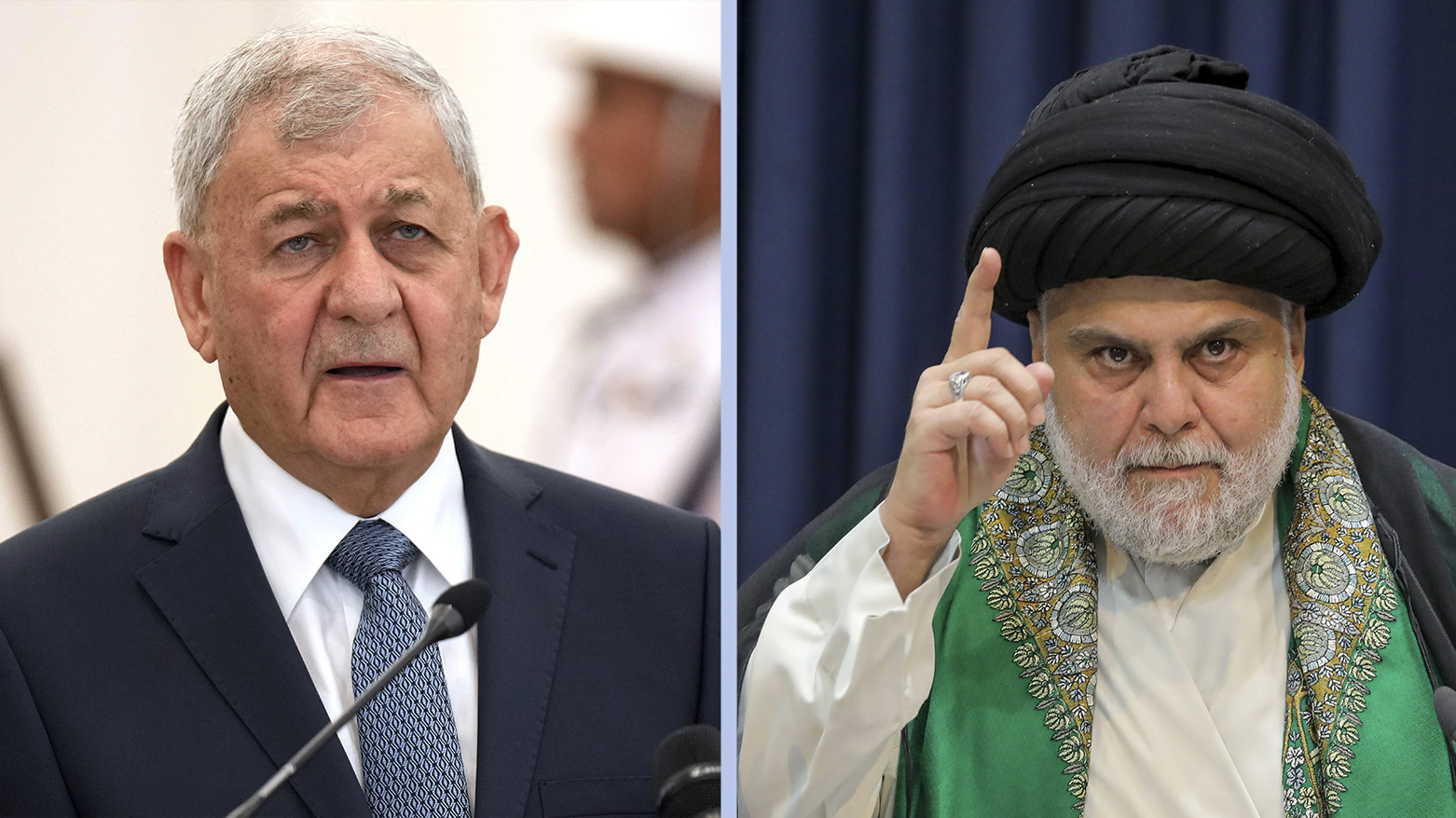‘Return to Politics,’ Rashid; ‘I Will Not Join the Corrupt,’ Sadr
“I have not participated, and I will never participate alongside the corrupt and the enemies of the people,” al-Sadr declared in response to calls for him to join the upcoming elections in Iraq.

By Kamaran Aziz
ERBIL (Kurdistan24) – In a firm and unequivocal response to Iraqi President Abdul Latif Jamal Rashid, the influential leader of the Shia National Movement, Sayyed Muqtada al-Sadr, on Friday reaffirmed his decision to boycott the upcoming parliamentary elections, declaring that he will not participate in a process he views as dominated by corruption and betrayal of the public trust.
The statement came just two days after President Rashid penned a public letter to al-Sadr, urging him to reconsider his political withdrawal and rejoin the electoral process for the Sixth Parliamentary Term. In his appeal, the President emphasized the importance of national unity and called the Sadrist absence from the electoral stage a critical void in the country’s political framework.
According to the President’s letter, dated April 16 and obtained by Kurdistan24, “A political process without the participation of the National Shiite Movement remains incomplete,” reflecting a widespread concern that al-Sadr’s boycott could undermine the inclusiveness and legitimacy of the upcoming vote. The President warned that continued absence by the National Shiite Movement risks leaving Iraq’s political process dangerously incomplete at a time of mounting internal and regional pressures.
President Rashid further emphasized that only through active participation in the Council of Representatives could the Sadrist movement effectively legislate reforms and address a backlog of essential service-related laws. "The time has now come for the return of the National Shiite Movement to political participation — in contribution, correction, and decision-making," he wrote.
In his letter, Rashid praised the historical legacy of the Sadr family in confronting dictatorship and defending national dignity, from Sayyed Muhammad Baqir al-Sadr to Sayyed Muhammad Sadiq al-Sadr. "You have continued their mission with steadfastness and dedication," he wrote, underscoring the deep reverence and expectations many Iraqis place on the Sadrists’ continued involvement.
Rashid’s message also highlighted growing regional instability, citing Israel’s actions in Palestinian, Syrian, and Lebanese territories, and the crisis in Gaza as indicative of an evolving Middle East that requires Iraq’s full political strength. He acknowledged that Iraq’s internal challenges — corruption, foreign interference, and mismanagement — had delayed reform, but he insisted that the path of correction remains open.
"Political momentum is now building," he wrote, noting that the Council of Ministers has set a date for elections and the Independent High Electoral Commission has opened registration. He concluded with a direct plea: "We call on Your Eminence to reconsider your decision to boycott participation. Iraq awaits the contributions of all its honorable sons. The people long for a representative parliament and a government that meets their needs. There is no alternative to resuming the project which you initiated."
Yet Sadr remained resolute. “When I called for boycotting the elections, I did not intend to postpone or cancel them,” he wrote in his response. “It saddens me that a great people participate in elections only to elect the corrupt and thieves of public money.” He continued, “I have not and will not participate alongside the corrupt and enemies of the people.”
Sadr’s sharp rebuke underscores the profound rift between his political vision and what he perceives as the prevailing culture of entrenched corruption and foreign influence within Iraq’s post-2003 political establishment. Known for his mass-based appeal and anti-corruption rhetoric, Sadr’s movement has frequently disrupted traditional power-sharing arrangements and remains a pivotal force in shaping Iraq’s political future.
His words reflect deep frustration with a system that, despite decades of international support and multiple rounds of elections, has failed to deliver basic services, accountability, or sovereignty. With the Independent High Electoral Commission moving forward with preparations and the political atmosphere heating up, Sadr’s continued withdrawal casts a long shadow over the legitimacy and competitiveness of the upcoming elections.
The absence of the National Shiite Movement, with its broad grassroots base, could lead to lower voter turnout, weakened representation for key constituencies, and a widening disconnect between Iraq’s political elite and its citizenry. With the electoral clock ticking and Iraq at a crossroads, Rashid’s call reflects the growing recognition among the country’s leadership that the absence of the Sadrists could tip the fragile political balance and deepen public disillusionment.